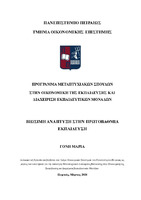Βιώσιμη ανάπτυξη στην πρωτοβάθμια εκπαίδευση
Sustainable development in primary education

Προβολή/
Λέξεις κλειδιά
Βιώσιμη ανάπτυξη ; Βιώσιμη ηγεσία ; Βιωματική μάθηση ; Εκπαιδευτικοί ; Μαθητές ; Προκλήσεις ; Sustainable development ; Sustainable leadership ; Sustainable education ; Sustainable learning ; Experiential learning ; Teachers ; Students ; ChallengesΠερίληψη
Η αειφόρος ανάπτυξη απασχολεί όλο και περισσότερο τις κοινωνίες τη σημερινή εποχή,
γεγονός που ωθεί τις κοινωνίες να ασχοληθούν περεταίρω με τους τρόπους ανάπτυξης της. Έχει
καθιερωθεί ως «το κοινό μας μέλλον» στην έκθεση Brundtland από τη Διεθνής Επιτροπή για
το Περιβάλλον και την Ανάπτυξη (1987). Παρόλο που, πλέον, απασχολεί πολλές κοινωνίες το
ζήτημα της αειφορίας, παρατηρούνται ακόμα μη αειφόρες τάσεις σε πολλούς τομείς. Όπως
έχει αποδειχθεί, ο τομέας της εκπαίδευσης είναι το πλέον κατάλληλο μέσο για την επίτευξη της
προώθησης της αειφόρου ανάπτυξης. Μέσα από την εκπαίδευση μπορούν να προωθηθούν η
αειφόρος ανάπτυξη και οι αντίστοιχες πρακτικές της, γεγονός που θα έχει ως αντίκτυπο τη
μετατόπιση των δραστηριοτήτων του ανθρώπου και των κοινωνιών σε ένα αειφόρο πλαίσιο για
ένα αειφόρο μέλλον για τις παρούσες και μελλοντικές γενιές.
Στόχος της παρούσας εργασίας είναι η ανάδειξη των αντιλήψεων των εκπαιδευτικών της
πρωτοβάθμιας εκπαίδευσης ως προς τη βιώσιμη ανάπτυξη, της στάσης των διευθυντών αλλά
και τρόπων αλλαγής της κουλτούρας διευθυντών, εκπαιδευτικών και μαθητών ώστε να
επιτευχθεί επιτυχώς η προώθηση των πρακτικών και των κύριων πυλώνων της αειφόρου
ανάπτυξης. O στόχος αυτός υλοποιήθηκε μέσω μιας ποσοτικής έρευνας η οποία ανέδειξε τις
αντιλήψεις των εκπαιδευτικών και μιας ποιοτικής έρευνας η οποία ανέδειξε τις αντιλήψεις των
διευθυντών αναφορικά με τη Βιώσιμη Ανάπτυξη στα ελληνικά σχολεία της πρωτοβάθμιας
εκπαίδευσης. Για την ποσοτική έρευνα χρησιμοποιήθηκε ένα ερωτηματολόγιο σε 160
εκπαιδευτικούς διαφόρων ομάδων και εκπαιδευτικών ιδρυμάτων πρωτοβάθμιας εκπαίδευσης
και για την ποιοτική έρευνα πραγματοποιήθηκε συνέντευξη σε 5 Διευθυντές διαφόρων
εκπαιδευτικών ιδρυμάτων πρωτοβάθμιας εκπαίδευσης. Τα ευρήματα αποκάλυψαν μια θετική
εικόνα όσον αφορά την υιοθέτηση βιώσιμων πρακτικών τόσο από τους εκπαιδευτικούς όσο και
από τους διευθυντές όμως η διαδικασία βρίσκεται ακόμα σε πρωταρχικά στάδια επομένως
απαιτούνται ολοκληρωμένες πρακτικές από όλους τους φορείς και συλλογική δράση για την
υιοθέτηση των αρχών της βιωσιμότητας. Επίσης, αναδείχθηκαν οι προκλήσεις αλλά και
αντίστοιχες λύσεις σχετικά με την υιοθέτηση βιώσιμων πρακτικών.


